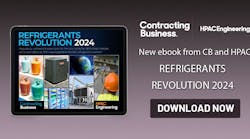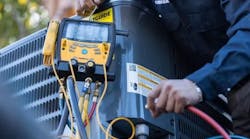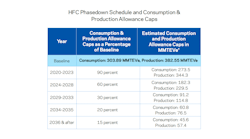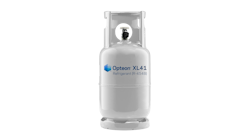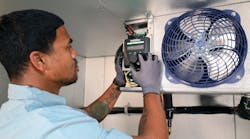Zone Mechanical, Alsip, IL has seen great success in its brief history, thanks to its dedicated workforce and full-service capabilities.
Zone Mechanical is privately owned by Dan Palubiak and Frank Petrosino, who incorporated the refrigeration and HVAC contracting company in 2002. The company is certainly in a “success zone,” and has been named to Entrepreneur Magazine’s list of the “Fastest Growing Companies in the U.S.” for four years in a row.
“For small businesses especially — which I believe is any company below $50 million in sales — your people are the key to your success,” Petrosino says. “You must have people with the drive to succeed. Procedures are wonderful, but can be worthless without the proper people to put them into practice. “We also believe in treating employees fairly. It pays off, because they stay with you and grow with the company.”
Striking Out on Their Own
Petrosino and Palubiak were two successminded individuals with solid industry backgrounds. Palubiak was a construction and service supervisor for a mechanical contractor, and Petrosino was a district manager for Tyler Refrigeration, a division of Carrier.
“We discussed our business plans, and thought we’d be good business partners, and made a run of it,” Petrosino says, and adds that he knew when it was time to move on to a bigger challenge.
“I’ve always liked the opportunity to do something different,” Petrosino says. “You can become stagnant, and need to challenge yourself after a period of time. I knew that with a strong effort, we could make it a successful business.”
Zone Mechanical’s business plan is based on full-service. It distributes Tyler refrigeration products to supermarket and industrial customers in Illinois and Indiana, and follows up the sale with installation and service.
Supermarket refrigeration accounts for 60% of Zone Mechanical’s clientele; 30% is warehouse, industrial, and manufacturing related, and 10% is HVAC and process piping.
Zone supports 55 employees. Its union technicians are trained on the latest in refrigerant conversions, leak detection, and computer programming.
Zone Mechanical ensures its trucks are well stocked for a day’s work, to eliminate travel time, which customers have to pay for.
“We believe in having a good inventory of parts on our trucks, so that you can service the customer properly at the location, rather than traveling back and forth,” Petrosino says. “That brings our inventory up, and our costs are higher at first glance. But if you continually add extra travel time, the customer gets ‘a little upset’ with that. We believe in taking care of the customer first.”
Gives Technology a Good First Look
Petrosino approaches technological trends with caution, and looks before he leaps.
“There’s a lot of hype right now over secondary systems, such as glycol — which has been around a long time — and carbon dioxide (CO2). Glycol is a good refrigerant, however some of the advantages just aren’t there in low temperature operations. In my opinion, the low- temp, secondary systems haven’t come to full fruition. People have said they’re more energy efficient, and cost less upfront; we don’t believe either of those statements are true. We don’t find that the secondary systems offer better efficiencies than regular Freon systems. The biggest advantage they have is that Freon is not going out to the evaporators in the store sales area, to produce cases or meat cases. You have glycol going out there rather than Freon. That is more environmentally friendly and slightly less costly. However, you still have Freon in the compressor room, because you’re using the Freon to cool the glycol. So the utility cost is the same, if not more, for a secondary system. The glycol systems are also more complex.”
Petrosino prefers to let the system design deliver the efficiency.
“If I need 50% load, I can design a system in which I have 52%, so it’s only 2% inefficient,” he says.
“The good news is, industry is phasing out the inefficient and environmentally-poor Freons — the HCFCs and CFCs — and replacing them with slightly more sophisticated Freons —the HFCs — which tend to do less damage to the environment.”
In addition to Tyler refrigeration products, Zone Mechanical’s preferred brands include Alto Sham; Coil Experts; Copeland and Bitzer compressors; Fluke instruments, and Sporlan valves.
